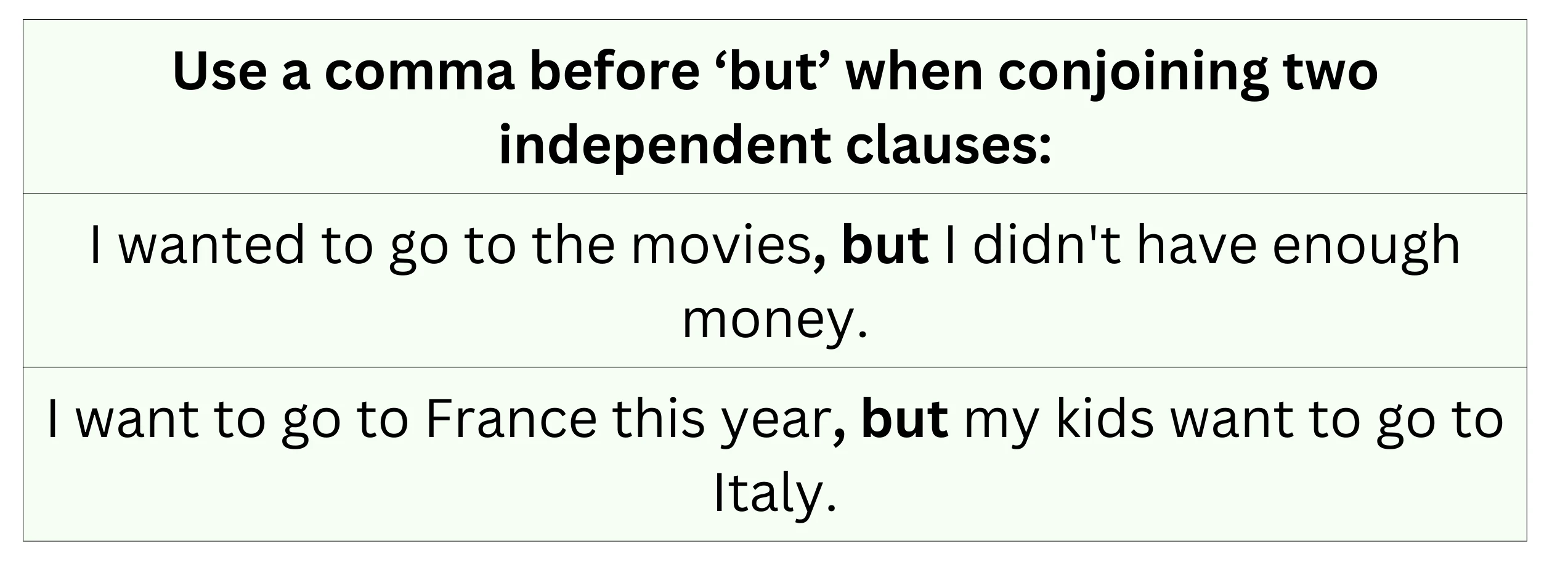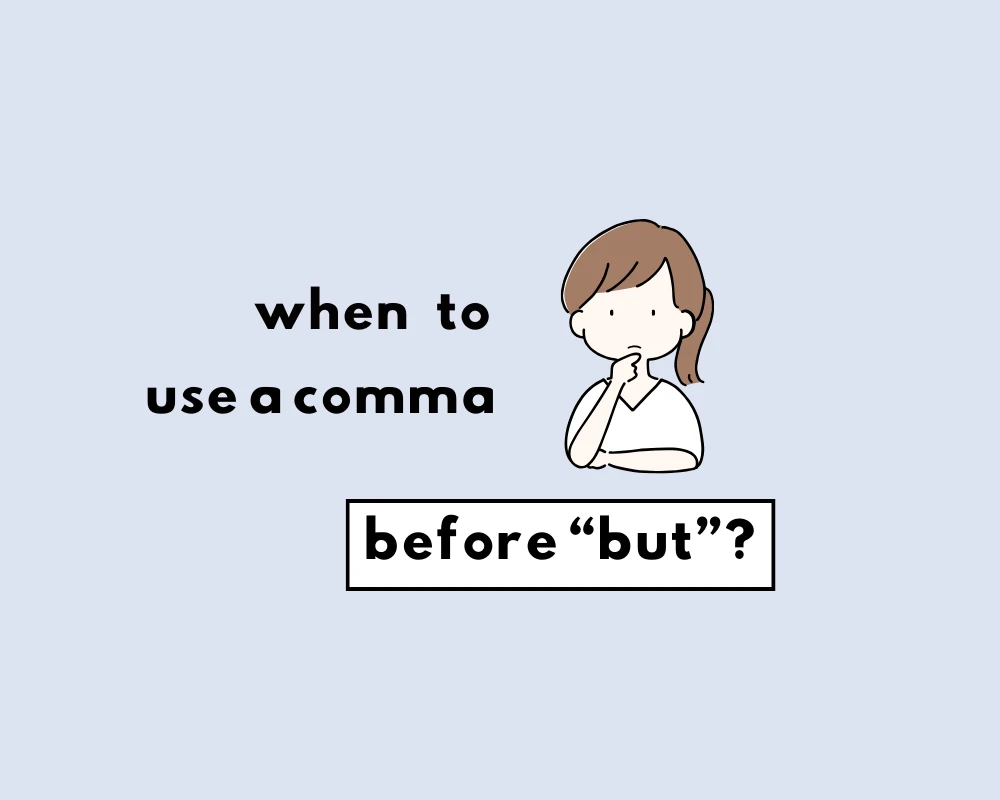When to use a comma before or after ‘but’?
When to use a comma ( , ) before or after ‘but‘ can depend on the context in which it’s used, but there are still standard rules where you should include a comma before the conjunction but. Let this post clarify when and where to use a comma before the coordinating conjunction, but.
The movie was long, but it was very entertaining.
She wanted to buy the red dress, but it was too expensive.
My brother loves chocolate but he hates vanilla.
The concert started late but the band played for a long time.
When connecting independent clauses

When you use “but” to join two independent clauses (each of which can stand alone as a sentence), a comma should be placed before “but”. This helps clarify the relationship between the two independent clauses (complete thoughts) that are being connected in a sentence. Here are some common cases when you should use a comma before “but”:
I wanted to go to the movies, but I didn’t have enough money.
She studied for hours, but she still didn’t do well on the test.
I want to go to France this year, but my kids want to go to Italy.
How can you tell if there are two independent clauses? If you can separate the clauses or string of words that come before ‘but’ and after into two standalone sentences, then they are independent clauses. For example, let’s take a look at the sentences above:
I wanted to go to the movies. I didn’t have enough money.
She studied for hours. She still didn’t do well on the test.
I want to go to France this year. My kids want to go to Italy.
Both parts can be separated to form their own separate sentences. The reason we would combine them into a compound sentence is to show the relationship between the two clauses, and that they are related.
Introductory Phrases: Sometimes, “but” is preceded by an introductory phrase or adverbial clause that provides context to the sentence. In such cases, a comma can be used before “but.”
After a long day at work, I was tired, but I still went to the gym.
In the end, they decided to go on the trip, but they had some reservations.
When “but” connects two full sentences (independent clauses), always place a comma *before* it. Remember: “Two clauses, comma before but!”.
Do not to use a comma before but when
As you might’ve guessed based on the above, we do not use a comma before but if both clauses are not independent or standalone sentences. Also, if “but” is used to connect two short and closely related phrases or if it appears in a compound predicate (where the subject is the same for both clauses), a comma is omitted.
Here are some other examples of cases when you don’t need a comma:
The restaurant was fantastic but very expensive.
He can sing but can’t dance.
Sarah has seven cats but only one dog.
See how with each of the above examples, the clause that follows the word but is dependent, meaning it isn’t a complete sentence on its own. Since these sentences use the coordinating conjunction ‘but’ to connect an independent clause with a dependent clause, we do not require a comma before ‘but’ in these cases.
In sentences where “but” is used to connect two actions that share the same subject, a comma is often omitted:
She works hard but plays harder.
He studied for the test but didn’t do well.
When to use a comma after ‘but’?
The cases where we would use a comma after ‘but’ are much more limited. A comma should appear after “but” is when it’s followed by an interrupter, which are phrases added for emphasis, or to qualify the statement in some way.
Teachers do, in fact, change lives.
Queen Victoria was, as they say, a formidable woman.
Interrupters that appear in the middle of a sentence should be offset with commas on either side.
Ultimately, the use of a comma before “but” depends on the structure and meaning of the sentence. If the sentence contains two independent clauses with “but” connecting them or if you want to emphasize a clear contrast, it’s appropriate to use a comma. However, if the clauses are closely related and the meaning is clear without a comma, you can omit it.
Work Sheet
According to the post, when should a comma generally be placed before the conjunction “but”?
How can you tell if two clauses joined by “but” are independent clauses?
Based on the post’s examples, which sentence correctly uses a comma before “but”?
The post indicates that a comma is required before “but” in the sentence “My brother loves chocolate but he hates vanilla.” Why?
According to the post, when should you NOT use a comma before “but”?
Fill in the blank with the correct punctuation/spacing based on the blog post’s examples: My brother loves chocolatebut he hates vanilla.
Fill in the blank with the correct punctuation/spacing based on the blog post’s examples: The concert started latebut the band played for a long time.
Fill in the blank with the correct punctuation/spacing based on the blog post’s examples: The movie was longbut it was very entertaining.
Fill in the blank with the correct punctuation/spacing based on the blog post’s examples: She wanted to buy the red dressbut it was too expensive.
Based on the rule for not using a comma before “but,” fill in the blank with the correct punctuation/spacing: I like coffeebut not tea.
Frequently Asked Questions
When to use a comma before ‘but’?
+
How to know if clauses need a comma with ‘but’?
+
Do I always put a comma before ‘but’?
+
Comma before ‘but’ after introductory phrase?
+
What is an example of comma usage before ‘but’?
+
Yash, D. "When to Use a Comma Before or After “But”?." Grammarflex, Jun 18, 2025, https://www.grammarflex.com/when-to-use-a-comma-before-or-after-but/.











